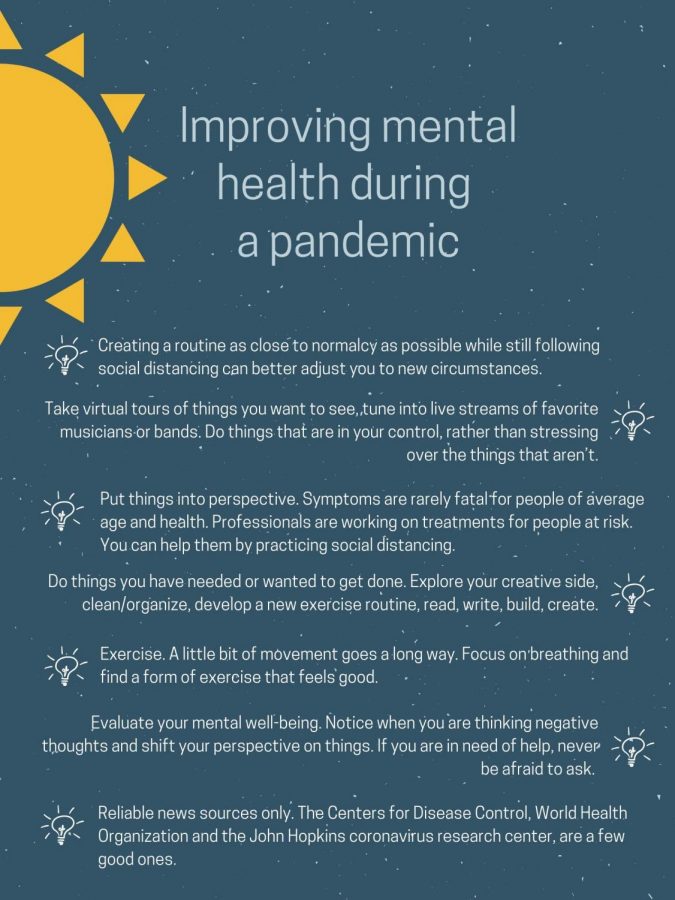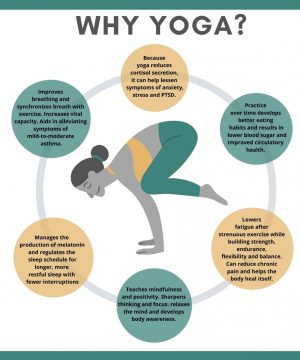The relationship between isolation and mental health
May 27, 2020
Humans are naturally social creatures, but when the ability of humans to socialize is greatly hindered, the results can have a strong effect on metal health.
“I’ve seen a big decline in my mental health lately and my anxiety has been a lot worse too,” junior Sophie Swift said. “In general, I’ve been feeling so unmotivated since the shutdown began. There aren’t any of the reassurances you would normally get from friends that make you feel better. When you’re by yourself, it’s so much easier to get into your own head.”
Long-term isolation and loneliness increase fear, anxiety and compulsive behaviors, reports Dr. Kelly Vincent in an article with Forbes. The brain’s emotional processing system goes into overdrive, causing feelings of panic, hysteria and loss of control, or physical symptoms, like insomnia, ill-digestion and increased heart rate.
“Not only does quarantine precipitate loneliness, it also causes an increase in mental health symptoms such as sadness, anger, anxiety and stress,” the Supervisor of Adult I/DD Services at Genesee Health System Amy Johnson said. “If people experience any of these, it is important to never minimize your symptoms. There are real diagnoses including depressive disorders, Anxiety Disorders, Trauma and Stress related Disorders. So while quarantine can have a challenging impact on our mental health, it can also bring about a unique opportunity for us to recover our mental health to total wellness.”
According to Johnson, people most commonly experience anxiety and depression in isolation. Common signs of anxiety are sweaty palms, flushed cheeks, a racing heartbeat, sadness and dark thoughts. Depression most often manifests in anger, increased fatigue and decreased appetite or motivation.
For people with pre-existing mental health conditions, Johnson recommends having a designated support person— whether a friend or a healthcare provider— and saving a crisis hotline number as a contact and practicing self care.
“Take care of yourself— your body and your mind,” Johnson said. “Approach your day by setting achievable goals for your physical health and mental health, such as making your bed in the morning, cooking a healthy breakfast, walking outside in the sunlight, limiting your time watching media or getting a good night’s sleep. The feeling of accomplishing goals is powerful. When you take care of the whole you, you may become more mindful.”
For natural extroverts, taking advantage of virtual modes of interaction can benefit mental health. Some have started doing common activities with friends over video calls, such as exercise routines, gaming and crafting. The shared activity provides a way for people to show others positive experiences. However, it still has its limits.
“I think there’s a certain sense of comfort and closeness that just isn’t there when you FaceTime,” Swift said. “Face to face interactions have always seemed more meaningful and have a greater impact. Personally, I get anxiety over virtual communication, so that really devalues a lot of what can be gained for me.”
In an article with Forbes, Dr. Jane Kreft reports limiting news consumption to five or 10 minutes a day, restricting news sources to experts such as healthcare providers and blocking off negative social media feed can improve mental health. Use the time normally spent on media platforms to help those in need.
“Every type of contact with people you care about is meaningful,” Johnson said. “By caring for your whole self and others around you, you notice the interconnectedness of your physical body, your mind and your community. Talk about mental health and embrace recovery throughout this journey; recognize your feelings, let go of judgment, reach your goals and reach out to your loved ones. This pandemic may be temporary, but the positive practices we embrace last forever.”
One such practice is weekly grief webinars, where community members come together to guide others through the loss of loved ones.
“One of the most important things to do is have a conversation about their loved ones and their loss,” Johnson said. “Any way you can express empathy towards that person will help. One thing people need to remember is that usually it’s the people around them that support them and help them become more resilient. You don’t have to be strong all day everyday but if you can tap some strength into different parts of your day that can help you recover.”
For those that need someone to talk to, reach out to a support person by texting “FLINT” to 741741 or call the crisis hotline at 810-257-3740.










